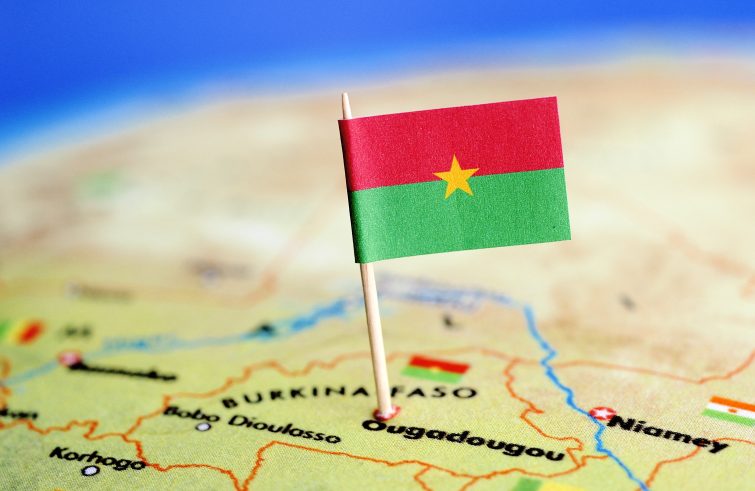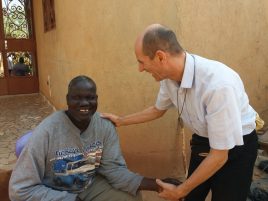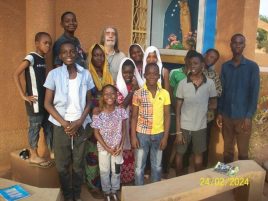
Burkina Faso is in mourning again. The Christian community has been shattered by the violent massacre of 15 worshippers in a Catholic church in Essakane, in the far north of the country, last Sunday. Twelve people died instantly and three others died of their wounds in hospital. A second attack took place at the mosque of the Islamic community, but no further details have yet been released. Father Jean-Pierre Sawadogo, Apostolic Vicar of the Diocese of Doro, wrote in a statement: “We pray that the wounds will heal and that the grieving hearts will be strengthened.” He added that he prayed for the “conversion” of the hearts of those who continue to sow death and destruction in the country. “We invite everyone,” he said, “to pray for those who have lost their lives for the faith.”
Putschists and the advance of jihadists. Burkina Faso, a former French colony almost the size of Italy (274,000 sq km), is landlocked and has been ruled by a military coup junta led by interim president Ibrahim Traoré since 30 September 2022.
Countering the advance of the jihadists without substantial support from outside the country remains a daunting task,
according to various local sources and testimonies provided to us. “The peculiarity of these attacks,” explains a local missionary, “is that no one is claiming responsibility, but we know from experience that we are dealing with jihadist terrorism aimed at controlling the territory for criminal purposes, even though there had been no attacks in this area for quite a while.”
 The revival of anti-colonialism and Putinism. More than a third of Burkina Faso is still in the hands of Islamist groups linked to Al-Qaeda. “The Essakane terrorists carried out their attacks in an area on the border with Mali, far from the control of the state authorities,” our source notes. In this phase marked by a revival of anti-colonial and anti-European sentiments, the military juntas of Mali, Niger and Burkina and the youth of the Sahel are drawn to Putin’s Russia and Erdogan’s Turkey, enchanted by the banners and propaganda of the new tide. “Putinism is widespread in the Sahel; the Russian national myth has emerged in the context of renewed national pride,” says Father Paolo Motta, missionary of the Villaregia Community in Otuagadogou. Father Paolo is parish priest in a suburban area of the capital city. He explains that he is “currently studying of the local languages in order to be closer to the people and understand their needs.” “It is only through dialogue,” he says, “and by trying to reach out and understand the most needy and the very young, that we can be of some concrete help.”
The revival of anti-colonialism and Putinism. More than a third of Burkina Faso is still in the hands of Islamist groups linked to Al-Qaeda. “The Essakane terrorists carried out their attacks in an area on the border with Mali, far from the control of the state authorities,” our source notes. In this phase marked by a revival of anti-colonial and anti-European sentiments, the military juntas of Mali, Niger and Burkina and the youth of the Sahel are drawn to Putin’s Russia and Erdogan’s Turkey, enchanted by the banners and propaganda of the new tide. “Putinism is widespread in the Sahel; the Russian national myth has emerged in the context of renewed national pride,” says Father Paolo Motta, missionary of the Villaregia Community in Otuagadogou. Father Paolo is parish priest in a suburban area of the capital city. He explains that he is “currently studying of the local languages in order to be closer to the people and understand their needs.” “It is only through dialogue,” he says, “and by trying to reach out and understand the most needy and the very young, that we can be of some concrete help.”
 Weapons and political isolation. Militarist propaganda is growing in the region, he explains, and young people, who make up the vast majority of the population, “are encouraged to focus on fighting rather than on school and education.” This approach is strongly condemned by the missionary Church. In addition, the aim of the putschist governments is to defeat jihadism with the sole support of Russian armaments and troops: but Turkish drones are also in circulation. “Geopolitical isolation and the creation of the Sahel Economic Alliance (which includes Mali, Burkina and Niger) risk worsening the situation of civil society,” says Father Mauro Armanino from Niger. The missionary of the African Missionary Society is firmly convinced that autarky “has always failed to bring about anything of value.” And this time will be no exception. His prediction is gloomy: “I fear that the worst is yet to come if this succession of autonomist-militarist choices continues. In the end, this latent totalitarianism will be to the detriment of the poorest sections of the population.”
Weapons and political isolation. Militarist propaganda is growing in the region, he explains, and young people, who make up the vast majority of the population, “are encouraged to focus on fighting rather than on school and education.” This approach is strongly condemned by the missionary Church. In addition, the aim of the putschist governments is to defeat jihadism with the sole support of Russian armaments and troops: but Turkish drones are also in circulation. “Geopolitical isolation and the creation of the Sahel Economic Alliance (which includes Mali, Burkina and Niger) risk worsening the situation of civil society,” says Father Mauro Armanino from Niger. The missionary of the African Missionary Society is firmly convinced that autarky “has always failed to bring about anything of value.” And this time will be no exception. His prediction is gloomy: “I fear that the worst is yet to come if this succession of autonomist-militarist choices continues. In the end, this latent totalitarianism will be to the detriment of the poorest sections of the population.”
“Here people still believe in life.” “Another worrying aspect for the Church in Burkina Faso is the people’s rejection of religions perceived as part of the colonial era. I am referring to both Islam and Christianity,” says Fr Paolo Motta. “At present, we are witnessing a revival of all traditional African religions, from animism to Kimbanguism, seen as an expression of indigenous pride.” And yet, according to Armanino, “the people here continue to believe in life, recklessly, improvising and, in the end, with an absolute faith in what is above us and is not the product of calculations and predictions. Here, the desert advances every day, we cultivate and export peanuts that contribute to its progress, we are surrounded by armed terrorist groups, and we wait for the rainy season to sow the seeds.”
(*) editorial staff “Popoli e Missione”










